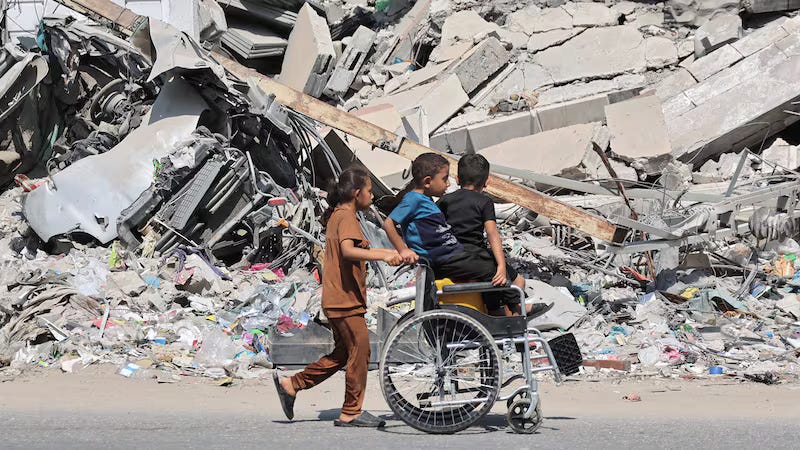
The Israeli war on Gaza has become a war on Palestinian children. This was as true on 7 October as it is today.
On 17 August, UN Secretary-General Antonio Guterres called for a seven-day ceasefire to allow children in Gaza to be vaccinated against polio. "I am appealing to all parties to provide concrete assurances right away, guaranteeing humanitarian pauses for the campaign," he said.
The first such case of the devastating epidemic was discovered in the town of Deir Al-Balah in the central Gaza Strip.
“It is scientifically known that for every 200 virus infections, only one will show the full symptoms of polio, while the remaining cases may present mild symptoms such as a cold or a slight fever,” Palestinian Health Minister Majed Abu Ramadan said on that same day.
This means that the virus may have spread to all parts of Gaza Strip, where the entire healthcare system has been largely destroyed.
The ten-month-old Palestinian baby who was first to contract the poliovirus, like many more, never received a vaccination dose against the disease.
To prevent an even greater disaster in war-stricken Gaza, the World Health Organization (WHO), along with the United Nations Children's Fund (UNICEF), said that they have to vaccinate 640,000 children throughout Gaza within a short period of time.
The task, however, is a difficult one, as the vast majority of Gazans are crammed into unsafe refugee camps—massive tent encampments, mostly in central Gaza with no access to clean water or electricity.
They are surrounded by over 330,000 tons of waste, which has further contaminated already undrinkable water which, according to experts, may have been the cause of the poliovirus.
The challenge of saving Gaza's children is complicated by the fact that Israeli bombs continue to be dropped on every part of Gaza, including the so-called “safe zones,” which were declared by Israel soon after the start of the war.
The other problem is that Gaza has, for months, subsisted without electricity. Without an efficient cooling system, the majority of the vaccines could become unusable.
But there is more to the suffering of Gaza’s children than the lack of vaccination.
As of August 19, at least 16,480 children have been killed as a direct result of the war, in addition to thousands more who remain missing, presumed dead. The number, according to the Palestinian Minister of Health in Gaza, includes 115 babies.
Many children have starved to death, and “at least 3,500 children in Gaza are facing (the same fate) amid a lack of food and malnutrition under Israeli restrictions on the delivery of food,” a ministry spokesman said.
Additionally, so far, more than 17,000 children in Gaza have either lost one or both parents since the start of the war on 7 October.
One of the main reasons as to why Gaza's children account for the majority of victims of the war is that homes, schools and displacement shelters have been the main targets of the relentless bombardment.
According to a statement by the UN Experts last April, "more than 80% of schools in Gaza (have been) damaged or destroyed."
“It may be reasonable to ask if there is an intentional effort to comprehensively destroy the Palestinian education system, an action known as ‘scholasticide’,” they wrote.
The trend of targeting schools continues. On 18 August, Palestine's Education Minister, Amjad Barham said that over 90 percent of all Gaza schools have been destroyed, the official Palestinian news agency, WAFA reported.
Of the 309 schools, 290 have been destroyed as a result of Israeli bombing. This has left 630,000 students with no access to education.
While homes and schools can be rebuilt, the precious lives of killed children cannot be restored.
According to the Palestinian Ministry of Education, as of 2 July, 8,572 students in Gaza and 100 in the occupied West Bank have been killed at the hands of the Israeli army. 14,089 students in Gaza and 494 in the West Bank have also been injured.
These are the worst losses suffered by Palestinian children within a relatively brief period of time since the Nakba, the destruction of the Palestinian homeland in 1948. The tragedy worsens by the day.
No child, let alone a whole generation of children, should endure this much suffering, regardless of the political reasoning or context.
International and humanitarian law has designated a “special respect and protection” for children during times of armed conflict, the international humanitarian law databases of the Red Cross resolve. These laws may apply to Palestinian children in theory, but certainly not in practice.
The betrayal of these children by the international community shall stain the collective consciousness of humankind for decades to come.
Indeed, this is a war on Palestinian children—a war that must stop before a whole generation of Palestinian children is completely erased.



